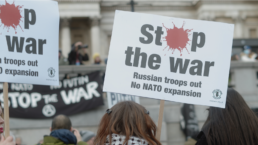By Vijay Prashad, Tricontinental: Institute for Social Research
The fragility of Europe’s energy supply has once again been on display in recent months. Gas shipments through the Nord Stream 1 pipeline, which runs from Russia to Germany, were reduced to 40 percent of capacity in June, a cut that Moscow said was due to delays in the servicing of a turbine by the German firm Siemens.

Shortly thereafter, on July 11, the pipeline was taken offline for 10 days for annual routine maintenance. Despite receiving assurances from Moscow that the supply would resume as scheduled, European leaders expressed fear that the shutdown would continue indefinitely in retaliation for sanctions imposed on Russia following the invasion of Ukraine.
On July 21, the flow of Russian gas into Europe resumed. Klaus Müller, the head Germany’s energy regulator, said that gas flows through Nord Stream 1 were below pre-maintenance levels during the first few hours of resumption, though they have now returned to 40 percent capacity.
European anxieties related to energy supply are linked to fears amongst the region’s governments of further instability in the Eurozone.
On the same day that Nord Stream 1 resumed operations, Italy’s Mario Draghi resigned as prime minister, the latest in a dramatic series of resignations by heads of government in Bulgaria, Estonia and the United Kingdom. Resistance from Europe to a peace agreement with Russia comes alongside recognition that trade with Russia is inevitable.
At No Cold War, an international platform seeking to bring sanity to international relations, we have been closely observing the shifting tenor of the war in Ukraine and the U.S.-driven pressure campaign against China.
Recent Posts
‘Unconstitutional. Unethical. Authoritarian.’ ICE Bars Millions Of Immigrants From Bond Hearings
July 18, 2025
Take Action Now One watchdog said the new policy “seems like a blatant attempt to stop them from exercising their right to due process.”……
Americans Are Not Nearly Alarmed Enough About Climate Change
July 18, 2025
Take Action Now Americans still don’t comprehend how imminent, dangerous, and far-reaching the threat is—and journalists are partly to blame.By…
The IRS Is Building A Vast System To Share Millions Of Taxpayers’ Data With ICE
July 17, 2025
Take Action Now ProPublica has obtained the blueprint for the Trump administration’s unprecedented plan to turn over IRS records to Homeland Security…
Israel’s Sudden Assault On Syria Is Unchecked Aggression
July 17, 2025
Take Action Now Jerusalem is bombing Damascus and threatening al-Sharaa’s rule, while Washington was hoping to help the nascent government on…




